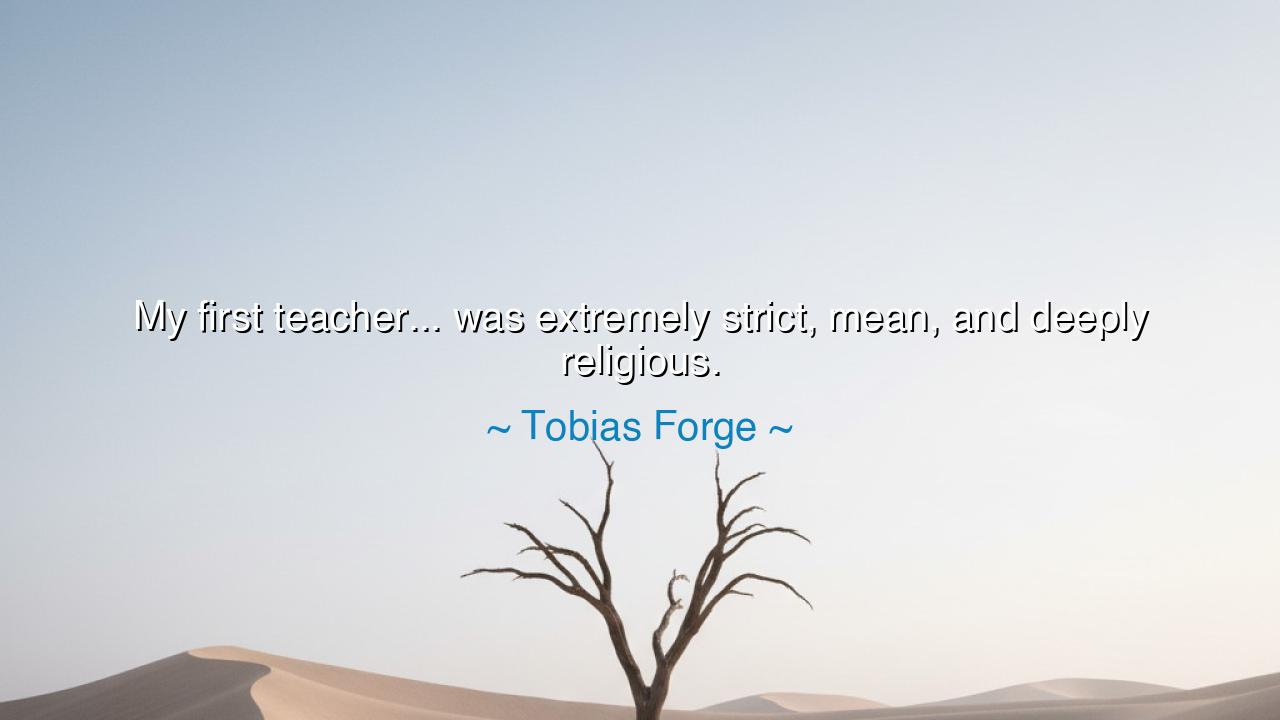
My first teacher... was extremely strict, mean, and deeply






Hear the words of Tobias Forge, who remembers the figure that first stood before him in the halls of learning: “My first teacher... was extremely strict, mean, and deeply religious.” Though brief, these words carry the weight of a child’s early impression, a memory etched not by kindness but by sternness and severity. In them we find the eternal truth that the first guide in our lives, whether gentle or harsh, becomes the hammer that strikes the iron of our spirit, shaping it in ways both painful and enduring.
The origin of this saying rests in Forge’s childhood, where the classroom was not yet a sanctuary of freedom but a place of discipline. The teacher, cloaked in authority, appeared to the young as both tyrant and prophet, wielding not only knowledge but fear. Strictness sharpened his awareness, meanness tested his resilience, and religion, heavy and dogmatic, cast long shadows upon his imagination. Such an influence can become either chain or spark: for some, it crushes the spirit; for others, it awakens the will to break free and find one’s own path.
Consider the story of Friedrich Nietzsche, who as a boy was raised under the stern hand of religious schooling. His teachers were rigid, demanding, bound to a God of rules rather than a God of freedom. Though it burdened him, it also gave rise to his defiance, to the fire that would later declare, “I teach you the overman.” Without the harshness of those early voices, perhaps his own voice would never have risen so powerfully. So too, Forge’s memory of a strict, mean, and deeply religious teacher may have planted the seeds of his own art, which blends the sacred and the profane, the light and the shadow.
The meaning of the quote is thus layered. It speaks first of the formative power of teachers, who leave marks upon the soul far deeper than they may know. But it also reminds us that even negative influences carry within them the possibility of transformation. What is cruel can awaken compassion; what is rigid can inspire freedom; what is oppressive can ignite rebellion. The early flame that scorches can also become the fire that tempers the steel.
The lesson here is not that strictness or religion themselves are evil, but that authority, when wielded without kindness, often drives the young to seek their own truths in opposition. To awaken the human spirit, one must balance discipline with love, conviction with compassion. And to those who suffered under harsh guides, Forge’s words remind us: your pain can be alchemy. You can take the iron rod that once oppressed you and forge from it the instrument of your own liberation.
Think also of Victor Hugo, who endured a childhood filled with conflict between his father’s harsh military discipline and his mother’s fervent religion. Out of this tension came his genius — the writer who gave us Les Misérables, who spoke of justice, mercy, and the dignity of the poor. The very forces that once pressed him became the fuel for a vision that sought to free humanity. Here again, the harsh teacher, whether parent or mentor, becomes the shadow against which the light of the soul shines.
Therefore, take these practical actions: If you are a teacher, remember the power of your words and actions, for you are shaping souls, not merely filling minds. If you are one who has endured harshness, take Forge’s memory as strength: let what once hurt you become the soil from which resilience grows. Do not carry bitterness, but transmute it into vision. And if you carry faith, let it not be a weapon of fear but a source of compassion, so that those who look back on you may say not only that you were strict, but that you were just, kind, and true.
So remember Forge’s words: “My first teacher... was extremely strict, mean, and deeply religious.” Though they speak of fear, they also remind us of endurance, of transformation, of the strange way that hardship becomes the forge of destiny. May we learn from this, both to wield our influence wisely and to turn our wounds into strength, so that what once oppressed us may instead propel us toward greatness.






AAdministratorAdministrator
Welcome, honored guests. Please leave a comment, we will respond soon